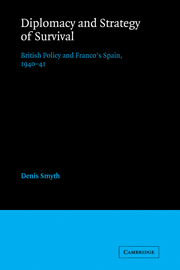Book contents
- Frontmatter
- Contents
- Preface
- Introduction
- 1 Britain and and the birth of Franco's Spain, 1936–39
- 2 Defining a policy
- 3 Opposition
- 4 The Spanish scene
- 5 Strategic diplomacy: September–October, 1940
- 6 Economic diplomacy: September–December, 1940
- 7 The Tangier crisis
- 8 The limits of attraction
- 9 The exhaustion of diplomacy
- Conclusion
- Notes
- Bibliography
- Index
- Frontmatter
- Contents
- Preface
- Introduction
- 1 Britain and and the birth of Franco's Spain, 1936–39
- 2 Defining a policy
- 3 Opposition
- 4 The Spanish scene
- 5 Strategic diplomacy: September–October, 1940
- 6 Economic diplomacy: September–December, 1940
- 7 The Tangier crisis
- 8 The limits of attraction
- 9 The exhaustion of diplomacy
- Conclusion
- Notes
- Bibliography
- Index
Summary
Countless and inestimable are the chances of war. Those who read the story, and still more those who share the dangers, of a campaign feel that every incident is surrounded with a host of possibilities, any one of which, had it become real, would have changed the whole course of events.
Britain's grand strategists indulged understandably in a form of ‘whistling in the dark’ during the period of their country's desperate struggle for survival in 1940–1. The three-pronged strategy which they elaborated to effect the destruction of Nazi Germany by way of bombs, blockade and ‘Bolshevism’, may have derived more from their own psychological necessity to conceive some path to victory than from any objective assessment of their real military, economic and political possibilities in the fight with the Axis. Certainly, British strategic thought had come to stress, well before the outbreak of war in 1939, the advantages of enervating aggressive German power by such indirect means, as against the frightful cost of direct military confrontation with the Wehrmacht. The lethargic Anglo-French search for oblique avenues of assault against Germany during the ‘Phoney War’ exemplifies this aversion to engaging in frontal combat. However, the resolution with which British strategists formulated, after the collapse of France, a grandiose plan for the reduction of German power by economic strangulation, aerial bombardment and popular subversion inside the Nazi-occupied countries, suggests that they were making a virtue of necessity.
- Type
- Chapter
- Information
- Diplomacy and Strategy of SurvivalBritish Policy and Franco's Spain, 1940-41, pp. 1 - 9Publisher: Cambridge University PressPrint publication year: 1986

